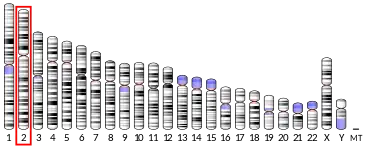MAL (gene)
Myelin and lymphocyte protein is a protein that in humans is encoded by the MAL gene.[5]
Function
The protein encoded by this gene is a highly hydrophobic integral membrane protein belonging to the MAL family of proteolipids. The protein has been localized to the endoplasmic reticulum of T-cells and is a candidate linker protein in T-cell signal transduction. In addition, this proteolipid is localized in compact myelin of cells in the nervous system and has been implicated in myelin biogenesis and/or function. The protein plays a role in the formation, stabilization and maintenance of glycosphingolipid-enriched membrane microdomains. Alternative splicing produces four transcript variants which vary from each other by the presence or absence of alternatively spliced exons 2 and 3.[5] The MAL protein is also thought to interact with the protein encoded by LSMEM1 based on two-hybrid screening.[6]
References
- GRCh38: Ensembl release 89: ENSG00000172005 - Ensembl, May 2017
- GRCm38: Ensembl release 89: ENSMUSG00000027375 - Ensembl, May 2017
- "Human PubMed Reference:". National Center for Biotechnology Information, U.S. National Library of Medicine.
- "Mouse PubMed Reference:". National Center for Biotechnology Information, U.S. National Library of Medicine.
- "Entrez Gene: MAL mal, T-cell differentiation protein".
- "LSMEM1". BioGRID. Retrieved 30 April 2015.
Further reading
- Frank M (Apr 2000). "MAL, a proteolipid in glycosphingolipid enriched domains: functional implications in myelin and beyond". Progress in Neurobiology. 60 (6): 531–44. doi:10.1016/S0301-0082(99)00039-8. PMID 10739088. S2CID 46329654.
- Alonso MA, Barton DE, Francke U (1988). "Assignment of the T-cell differentiation gene MAL to human chromosome 2, region cen----q13". Immunogenetics. 27 (2): 91–5. doi:10.1007/BF00351081. PMID 3257199. S2CID 30129595.
- Alonso MA, Weissman SM (Apr 1987). "cDNA cloning and sequence of MAL, a hydrophobic protein associated with human T-cell differentiation". Proceedings of the National Academy of Sciences of the United States of America. 84 (7): 1997–2001. doi:10.1073/pnas.84.7.1997. PMC 304570. PMID 3494249.
- Rancaño C, Rubio T, Alonso MA (May 1994). "Alternative splicing of human T-cell-specific MAL mRNA and its correlation with the exon/intron organization of the gene". Genomics. 21 (2): 447–50. doi:10.1006/geno.1994.1294. PMID 8088843.
- Rancaño C, Rubio T, Correas I, Alonso MA (Mar 1994). "Genomic structure and subcellular localization of MAL, a human T-cell-specific proteolipid protein". The Journal of Biological Chemistry. 269 (11): 8159–64. PMID 8132541.
- Millán J, Puertollano R, Fan L, Rancaño C, Alonso MA (Jan 1997). "The MAL proteolipid is a component of the detergent-insoluble membrane subdomains of human T-lymphocytes". The Biochemical Journal. 321 ( Pt 1) (1): 247–52. doi:10.1042/bj3210247. PMC 1218061. PMID 9003426.
- Millán J, Puertollano R, Fan L, Alonso MA (Apr 1997). "Caveolin and MAL, two protein components of internal detergent-insoluble membranes, are in distinct lipid microenvironments in MDCK cells". Biochemical and Biophysical Research Communications. 233 (3): 707–12. doi:10.1006/bbrc.1997.6530. PMID 9168919.
- Martín-Belmonte F, Kremer L, Albar JP, Marazuela M, Alonso MA (Apr 1998). "Expression of the MAL gene in the thyroid: the MAL proteolipid, a component of glycolipid-enriched membranes, is apically distributed in thyroid follicles". Endocrinology. 139 (4): 2077–84. doi:10.1210/en.139.4.2077. PMID 9528996.
- Köhler C, Håkansson A, Svanborg C, Orrenius S, Zhivotovsky B (Jun 1999). "Protease activation in apoptosis induced by MAL". Experimental Cell Research. 249 (2): 260–8. doi:10.1006/excr.1999.4472. PMID 10366425.
- Frank M, Schaeren-Wiemers N, Schneider R, Schwab ME (Aug 1999). "Developmental expression pattern of the myelin proteolipid MAL indicates different functions of MAL for immature Schwann cells and in a late step of CNS myelinogenesis". Journal of Neurochemistry. 73 (2): 587–97. doi:10.1046/j.1471-4159.1999.0730587.x. PMID 10428054.
- Puertollano R, Alonso MA (Oct 1999). "MAL, an integral element of the apical sorting machinery, is an itinerant protein that cycles between the trans-Golgi network and the plasma membrane". Molecular Biology of the Cell. 10 (10): 3435–47. doi:10.1091/mbc.10.10.3435. PMC 25613. PMID 10512878.
- Erne B, Sansano S, Frank M, Schaeren-Wiemers N (Aug 2002). "Rafts in adult peripheral nerve myelin contain major structural myelin proteins and myelin and lymphocyte protein (MAL) and CD59 as specific markers". Journal of Neurochemistry. 82 (3): 550–62. doi:10.1046/j.1471-4159.2002.00987.x. PMID 12153479. S2CID 39619359.
- Copie-Bergman C, Plonquet A, Alonso MA, Boulland ML, Marquet J, Divine M, Möller P, Leroy K, Gaulard P (Nov 2002). "MAL expression in lymphoid cells: further evidence for MAL as a distinct molecular marker of primary mediastinal large B-cell lymphomas". Modern Pathology. 15 (11): 1172–80. doi:10.1097/01.MP.0000032534.81894.B3. PMID 12429796.
- Kazemi-Noureini S, Colonna-Romano S, Ziaee AA, Malboobi MA, Yazdanbod M, Setayeshgar P, Maresca B (Jun 2004). "Differential gene expression between squamous cell carcinoma of esophageus and its normal epithelium; altered pattern of mal, akr1c2, and rab11a expression". World Journal of Gastroenterology. 10 (12): 1716–21. doi:10.3748/wjg.v10.i12.1716. PMC 4572255. PMID 15188492.
- Llorente A, de Marco MC, Alonso MA (Oct 2004). "Caveolin-1 and MAL are located on prostasomes secreted by the prostate cancer PC-3 cell line". Journal of Cell Science. 117 (Pt 22): 5343–51. doi:10.1242/jcs.01420. PMID 15466889.
- Dukhovny A, Goldstein Magal L, Hirschberg K (2006). "The MAL proteolipid restricts detergent-mediated membrane pore expansion and percolation". Molecular Membrane Biology. 23 (3): 245–57. doi:10.1080/09687860600601445. PMID 16785208. S2CID 22747639.
- Mimori K, Nishida K, Nakamura Y, Ieta K, Yoshikawa Y, Sasaki A, Ishii H, Alonso MA, Mori M (May 2007). "Loss of MAL expression in precancerous lesions of the esophagus". Annals of Surgical Oncology. 14 (5): 1670–7. doi:10.1245/s10434-006-9064-2. PMID 17151798. S2CID 7756279.




